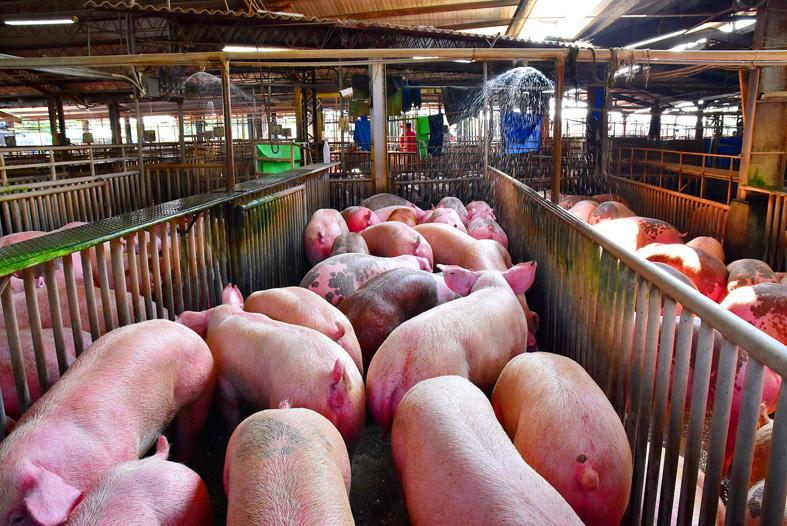Taiwan’s pork products could be sold to more countries if vaccinations against classical swine fever were no longer needed, Council of Agriculture (COA) Deputy Minister Huang Chin-cheng (黃金城) said on Saturday.
The World Organisation for Animal Health last year declared Taiwan proper, Penghu and Matsu free of foot-and-mouth disease without the need for vaccination, allowing the nation to begin exporting pork.
However, countries such as Japan still ban imports of pork products from areas with classical swine fever, including Taiwan.

Photo: Huang Shu-li, Taipei Times
To enable the nation to sell pork to more countries, the council said it is conducting a “no shots” project at more than 300 local farms.
At each farm, 16 to 24 porkets are not vaccinated against classical swine fever, but are raised with vaccinated pigs, it said, with the aim of observing whether the unvaccinated pigs become infected when they grow up, it said.
The first 3,000 “sentinel” pigs from 150 farms would soon be slaughtered, and no classical swine fever has so far been detected among them, Huang said.
The project would continue until June next year, and if everything goes smoothly, the council would evaluate whether to stop vaccinating all pigs against the virus, he said.
It is very difficult to eliminate classical swine fever, especially when it can spread to wild boars, he added.
Virus transmission is relentless among wild pigs, so it is impossible to stop vaccinations once they are infected, Huang said.
For more than a decade, no new cases of classical swine fever have been reported in Taiwan, and the fever has not been detected among wild pigs, a key factor allowing the council to initiate the “no shots” project, Huang said.
Once the nation is free of classical swine fever, its pork products could be sold worldwide, he said, expressing optimism over the prospect.

Eight restaurants in Taiwan yesterday secured a one-star rating from the Michelin Guide Taiwan for the first time, while three one-star restaurants from last year’s edition were promoted to two stars. Forty-three restaurants were awarded one star this year, including 34 in Taipei, five in Taichung and four in Kaohsiung. Hosu (好嶼), Chuan Ya (川雅), Sushi Kajin (鮨嘉仁), aMaze (心宴), La Vie by Thomas Buhner, Yuan Yi (元一) and Frassi in Taipei and Front House (方蒔) in Kaohsiung received a one-star rating for the first time. Hosu is known for innovative Taiwanese dishes, while Chuan Ya serves Sichuan cuisine and aMaze specializes

STATS: Taiwan’s average life expectancy of 80.77 years was lower than that of Japan, Singapore and South Korea, but higher than in China, Malaysia and Indonesia Taiwan’s average life expectancy last year increased to 80.77 years, but was still not back to its pre-COVID-19 pandemic peak of 81.32 years in 2020, the Ministry of the Interior said yesterday. The average life expectancy last year increased the 0.54 years from 2023, the ministry said in a statement. For men and women, the average life expectancy last year was 77.42 years and 84.30 years respectively, up 0.48 years and 0.56 years from the previous year. Taiwan’s average life expectancy peaked at 81.32 years in 2020, as the nation was relatively unaffected by the pandemic that year. The metric

Taitung County is to launch charter flights to Malaysia at the end of this year, after setting up flights to Vietnam and Thailand, the Taitung County Government said yesterday. The new charter flight services, provided by low-cost carrier Batik Air Malaysia, would be part of five-day tour packages for visits to Taitung County or Malaysia. The Batik Air charter flight, with about 200 seats, would take Malaysian tourists to Taitung on Dec. 30 and then at 12:35pm return to Kuala Lumpur with Taiwanese tourists. Another charter flight would bring the Taiwanese home on Jan. 3 next year, arriving at 5:30pm, before taking the

Taiwan High Speed Rail Corp. (THSRC) plans to ease strained capacity during peak hours by introducing new fare rules restricting passengers traveling without reserved seats in 2026, company Chairman Shih Che (史哲) said Wednesday. THSRC needs to tackle its capacity issue because there have been several occasions where passengers holding tickets with reserved seats did not make it onto their train in stations packed with individuals traveling without a reserved seat, Shih told reporters in a joint interview in Taipei. Non-reserved seats allow travelers maximum flexibility, but it has led to issues relating to quality of service and safety concerns, especially during